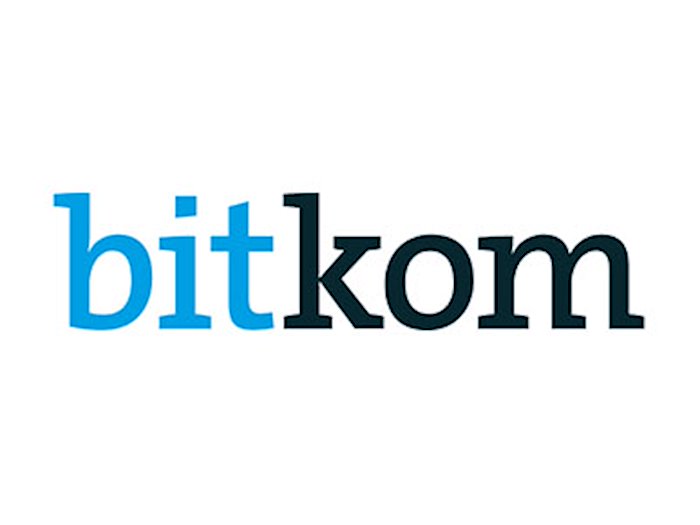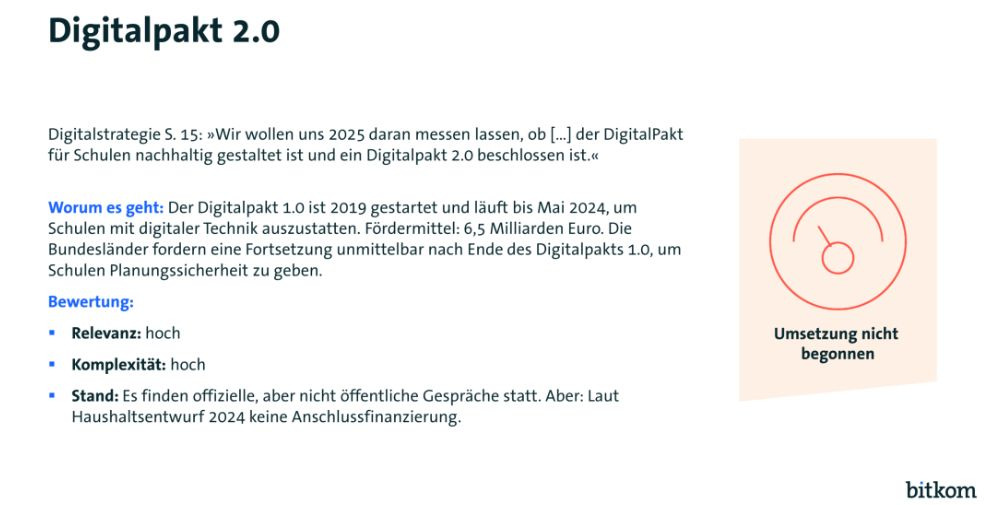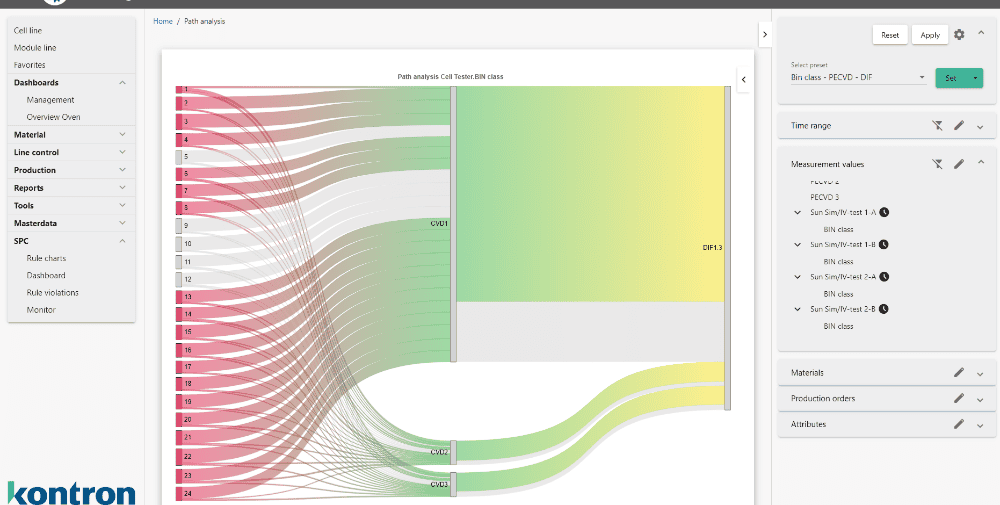
This corresponds to a share of 11 percent. 219 projects (66 percent) are currently being implemented, while 77 projects, or just under one in four (23 percent), have not yet been started. This is shown by the “Digital Policy Monitor”, which Bitkom presented today (Monday) and which will be updated regularly in the future. “The German government has set itself an ambitious program, but is not keeping up with implementation,” says Wintergerst, categorizing the results of the study. In Wintergerst’s view, major construction sites are the digitization of administrations and schools, as well as data policy. On the other hand, great progress has been made in the expansion of broadband and mobile networks, and good progress is now also being made in the digitization of healthcare.
For the “Digital Policy Monitor,” Bitkom first identified the digital policy projects listed in the coalition agreement and the digital strategy. In total, there are 139 projects from the digital strategy, 193 projects from the coalition agreement, and two additional digital policy projects that the federal government has subsequently taken up. These 334 digital projects were assigned to the lead ministries and then examined for their implementation status.
When it comes to the sheer number of digital policy projects, it is not the digital ministry that comes out on top. In first place by a wide margin is the Federal Ministry of the Interior, with 80 digital projects to be completed. This means that Nancy Faeser is responsible for almost every fourth digital project in the German government. It is followed in second place by the Federal Ministry of Education and Research with 57 projects, in third place by the Federal Ministry of Economics and Climate Protection with 46 projects, and in fourth place by the Federal Ministry of Digital Affairs & Transport with 45 projects. Wintergerst: “The four ministries of the interior, research, economy and digital affairs together have more than 220 digital projects to tackle and thus bear the bulk of responsibility for digital Germany.” At the bottom of the rankings are the Federal Ministry of Defense with 6 projects and the Federal Ministry for Economic Cooperation with not a single digital project. “Responsibilities for digital policy are extremely broadly distributed among the ministries – the Bitkom Monitor also shows this. Whether this broad distribution of responsibilities is really the last word in wisdom should be reconsidered and corrected if necessary. First, however, the German government must complete all 334 digital policy projects in its current list. That is how it will be judged.”
For the “Digital Policy Monitor,” in addition to the implementation status, the importance of the projects for the digitization of the economy, society and the state was also examined and the projects were classified in terms of their complexity. Wintergerst: “We see an extreme range of projects of varying relevance and complexity. Some are hardly worth mentioning, while other projects are really big, need a lot of resources and require extensive coordination with the federal states or the EU.” For example, the federal government’s digital policy program includes micro-projects such as the “digitization of airport handling processes” or a “feasibility study on the land register on the blockchain” alongside elaborate and highly complex projects such as the implementation of the so-called “Once Only Principle” in administration. This principle is intended to ensure that citizens will be able to deposit data in one place in the future and will not have to specify it again in every administrative process – no easy undertaking given the tasks distributed between 11,000 municipalities, 16 states and the federal government.
Digital Pact 2.0 and OZG 2.0 still a long way from implementation
The Digital Pact 2.0, for example, stands out negatively in the study, a project with equally high relevance and complexity. The Digital Pact 1.0 was launched in 2019 and runs until May 2024 to equip schools with digital technology. Cost: 6.5 billion euros. The federal states are calling for a continuation immediately after the end of Digital Pact 1.0 to give schools planning security – many would not be able to continue the digital formats they have introduced without further funding from the federal government. “Together with the states, we will launch a Digital Pact 2.0 for schools that will run until 2030,” says the coalition agreement between the SPD, Greens and FDP. Nevertheless, the draft budget for 2024 does not yet include any follow-up funding for the Digital Pact 1.0. There is also no apparent approach as yet as to how a Digital Pact 2.0 could be structured. Wintergerst: “Our schools are now 20 years behind countries like Denmark. The Digital Pact 2.0 must therefore be agreed and adopted as a matter of urgency. Investments in education are always investments in the future. If we continue to do nothing here, it will not only go against the interests and wishes of the students, but will also harm the economy and society.”
The draft budget for 2024 also does not include the digital budget announced in the coalition agreement. This was supposed to finance important digital projects and was already missing in 2023. Wintergerst: “With all understanding for the need to exercise more budget discipline again: Anyone who saves on digitization is saving in completely the wrong place. Digitization can do one thing in addition to ‘simpler, faster and better’: save costs for today’s manual and paper-heavy lengthy procedures.”
One of the unfinished business is the Online Access Act (OZG) 2.0, one of the German government’s most important digital policy projects. The original Online Access Act 1.0 was intended to enable all administrative services to be handled online by the end of 2022. This goal was missed by a wide margin. The OZG 2.0 is intended as a follow-up law to make up for the shortfall. However, work on an OZG 2.0 has only just begun, the financing of the measures is uncertain and deadlines were dispensed with altogether this time. “The backward German administration is growing into a veritable locational disadvantage that burdens households and companies alike. Digital administration doesn’t just mean that citizens can apply for birth certificates and passports digitally. Digital administration also means digitizing and simplifying approval procedures and reporting requirements for companies. Bureaucracy is currently the biggest brake on digital Germany,” emphasizes Wintergerst.
Progress in healthcare and infrastructure expansion
In contrast, great progress is being made in the digitization of healthcare. This includes, among other things, the nationwide introduction of the electronic patient file. According to the digital strategy, it is to be used by at least 80 percent of insured persons by 2025. The draft bill of the Federal Ministry of Health’s digitization strategy provides for opt-out, meaning that the ePA will be automatically activated for insured persons unless they object. From Bitkom’s point of view, this plan must now be implemented just as consistently as the already initiated acceleration of planning and approval for digital infrastructure. The expansion of mobile communications and broadband networks already made great progress last year, and Germany now ranks fourth in Europe in terms of the provision of telecommunications services. The federal government’s Telecommunications Network Expansion Acceleration Act, which is intended to modernize, de-bureaucratize and, above all, digitize planning and approval procedures, is expected to go to cabinet before the end of the summer.
The federal government has also set out to make Germany a global location for the semiconductor industry. 90 percent of industrial companies rely on semiconductors. But: Germany and Europe are heavily dependent on semiconductor imports. In hardly any other area has the German government been as active as here, providing billions of euros in subsidies to encourage large-scale private investment in new chip factories in Dresden, Magdeburg and Saarbrücken, among other places. In addition, billions in funding for 31 other projects was confirmed, further strengthening the attractiveness and innovative power of Germany as a semiconductor location.
The amendment to the Skilled Workers Immigration Act has also already been implemented. There is a shortage of IT specialists throughout Germany, with 137,000 unfilled positions across all industries at the end of 2022. To solve this problem, targeted, qualified immigration is necessary, among other things. The coalition government has therefore set out to develop immigration law accordingly. The corresponding amendment was passed by the Bundestag and Bundesrat before the summer. Wintergerst: “We welcome the fact that the federal government has brought this project to a provisional conclusion after a long struggle. Nevertheless, some improvements are still necessary. For example, the processes for issuing visas should be fully digitized.”
In practice, the project to promulgate laws and ordinances digitally went smoothly. Up to and including 2022, the official promulgation of laws and ordinances took place exclusively in the printed Federal Law Gazette. This has already changed since Jan. 1, 2023 – the Federal Law Gazette is now exclusively available digitally and can be accessed online as a PDF. “The federal government’s digital policy is made up of many small and some large projects. Smaller projects should not be put on the back burner and should be implemented as soon as possible. They also have an impact and ensure greater efficiency and transparency,” emphasizes Wintergerst.
Wintergerst appeals to the federal government to devote more attention to digital policy and to use the second half of the legislative period to bring the 296 digital policy projects that are still open to a conclusion: “The first half of the government’s term is coming to an end soon, but 89 percent of the federal government’s digital policy projects are still open. A cross-departmental show of strength in digital policy is now needed if the federal government is serious about digital policy and wants to make a success of its many good projects.” At present, he said, Germany is lagging behind many nations, including not only countries such as the United States and China, but also many smaller countries such as Denmark, Austria and Estonia. Germany needs to do more for its digital competitiveness, he said. Wintergerst: “A hesitant digital policy burdens the economy and causes annoyance among citizens. Yet digitization is not an end in itself; it serves people.” The Bitkom president points out that digital technologies play an outstanding role in Germany’s economic performance and social prosperity. They are crucial for overcoming major challenges such as decarbonization and demographic change. For example, 41 percent of the German government’s CO2 reduction targets could be achieved by 2030 through accelerated digitization. “The last few years have been marked by numerous crises. However, the answer to this cannot be less digitization, but more. Whether in administration or in companies, whether in doctors’ practices or in schools: Digital technologies make Germany more resilient and crisis-proof; they secure our competitiveness, our social cohesion and our future.”
– – – –
Further links
👉 www.bitkom.org
👉 Monitor Digitalpolitik
Graphic: Bitkom




